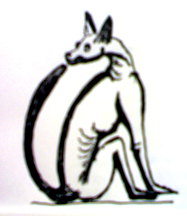May 2009

Imbwa inzifu yemanya.
(Luyia)Mbwa aibaye yuajijua. (Swahili)
A thieving dog knows itself. (English)
Luyia (Kenya) Proverb
Background, Explanation, Meaning and Everyday Use
Luyia is a cover term for between 17 and 23 subtribes each with its own language. The Wanga-speaking people form a huge section of this overall Luyia community who live mainly in Western Kenya. The Nabongo dynasty which existed in the pre-colonial and colonial times in Kenya was among the Wanga, specifically, the Abashitseste clan. There are other clans such as the Abakolwe. As explained by John Wanga Ambululi of Khabakaya Village in Mumias, thieves exist in the society and this proverb is specifically intended for them. Being a hardworking society, the Wanga believe that everyone should work so as to earn a living. Those wishing to pursue illegal and unsocial means of acquiring wealth such as stealing other people’s property were highly discouraged, warned and sometimes punished severely.
This Wanga proverb was used to warn thieving minds that even if they stole and were not caught, their guilty conscience would surely betray them. As Ambululi explains the proverb further, a thief will shudder and behave suspiciously on seeing law enforcers. His own actions will prompt law enforcers to suspect and investigate him and subsequently find him guilty. Therefore those intending to steal were forewarned in this way in that their own actions will betray them. So they better not do any thieving in the first place.
Biblical Parallels
“Then Joshua said to Achan, ‘My son, give glory to the Lord God of Israel and make confession to him. Tell me now what you have done; do not hide it from me.’ And Achan answered Joshua, ‘It is true; I am the one who sinned against the Lord God of Israel. This is what I did’” (Joshua 7:19-20).
Contemporary Use and Religious Application
 Moreover this proverb can be used to warn those intending to engage in communal vices like land grabbing, engaging in scandals that lead to the lack of commodities like oil and maize and oppressing the poor. It warns them that even if they do not confess their bad actions, their sins will surely weigh on their consciences so they better avoid sinning altogether.
Moreover this proverb can be used to warn those intending to engage in communal vices like land grabbing, engaging in scandals that lead to the lack of commodities like oil and maize and oppressing the poor. It warns them that even if they do not confess their bad actions, their sins will surely weigh on their consciences so they better avoid sinning altogether.
NOTE: To show the richness of the Luyia language here is the original text of this proverb in other languages of the Luyia sub-tribes:
Bakhayo: Imbwa inzifi yemanya.
Bukusu: Embwa enjifwi yemanya.
Kisa: Imbwa inzifi yemanya.
Lwisukha: Isimbwa imbuvi yaimanya.
Marachi: Imbwa injifi yemanya.
Maragoli: Imbwa inzivi yayema.
John Siyumbu
P.O Box 781
50200 Bungoma, Kenya
Cellphone: 0725-934810
Email: jsiyumbu@yahoo.com
Illustrations provided by:
Professor Cephas Yao Agbemenu
Department of Fine Arts
Kenyatta University
P.O. Box 43844
Nairobi, Kenya
Cellphone: 0723-307992
Email: cyagbemenu@yahoo.com

